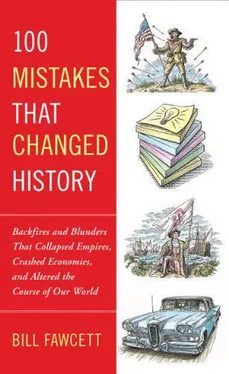The problem of mixed signals on Korea was also complicated by politics. President Truman was a Democrat, and the Congress was controlled by the Republican Party. And the Republicans did not like many of Truman’s foreign policies. As a result, when Truman requested $60 million in aid for South Korea, Congress refused to pass it. Then a bill that would finance 500 advisers and training personnel to assist in equipping the South Korean army with modern weapons was defeated in the House by the close vote of 193 to 192. Those in power in Moscow and Pyongyang saw a clear message. America was abandoning South Korea.
An action taken by Truman on April 25, 1950, might have cleared up the matter and put the North Koreans on notice. This was National Security Directive 68, which committed American resources to counter any communist aggression “anywhere in Asia.” It was a strong and clear statement and could have been an equally clear warning. The problem was national security directives are classified top secret.
A public statement by John Foster Dulles, Truman’s special envoy to Asia, likely was intended to put the communists on notice. Unfortunately, he worded his statement in typical diplomatic terms, obscuring the message. The closest Dulles came to a definitive statement was in his speech to the South Korean Assembly. He said that America was “faithful to the cause of human freedom and loyal to those everywhere who honorably support it.” Not exactly fighting words to warn off an aggressor.
North Korean troops poured over the thirty-eighth parallel on June 17, 1950. The poorly armed and disorganized South Korean army was incapable of serious resistance. The few American units in Korea were quickly forced to retreat south. Then the world responded to the invasion.
After all they had heard, it was likely that both Stalin and Kim Il-sung found the adamant reaction by the United States a shock. Had the Soviet Union or China actually expected a military response from Truman, it is likely that they would have not allowed Kim Il-sung to attack. Certainly they would not have let the invasion happen while they were boycotting the Security Council. Because the Russians were not attending the UN Security Council meetings, the council was able to pass a resolution calling for strong military force to support and restore South Korea. Before the conflict ended, 50,000 UN soldiers, mostly Americans, were killed along with many times that number of North Koreans and then Chinese. It was a high price to pay for what was effectively just sloppy language.
MacArthur and the Chinese
1950
The mistake that changed the Korean War and cost more than 10,000 American lives was caused by ego. Not just the ego of one man, though there was a man whose ego was as enormous as his reputation. That man was General Douglas MacArthur. It also involved a bad attack of victory disease by the chief of staff and a good bit of racial prejudice. The problems that resulted from this mistake are still in the news.
It all began because the North Korean Army (NKA) attacked South Korea. (The diplomatic mistakes that caused this are discussed on pages 335-337.) In the first few weeks after their surprise attack, the NKA forced the few South Korean and American divisions into a small area in a southern corner of the Korean peninsula that became known as the Pusan Perimeter. Then, on September 5, in a bold move, MacArthur landed 70,000 men at Inchon. The successful landing was above and behind the bulk of the North Korean Army. Within days, the Americans had taken back Seoul and fought their way across Korea. At the same time, United Nations forces in the Pusan Perimeter broke out and swept north. Cut off from retreat, not to mention food, ammunition, and fuel, while pressed from two sides, the NKA simply collapsed.
North Korea was a communist country, and it was known that it got support from Red Premier Mao’s China. When it was apparent that there were no longer substantial North Korean forces left to even slow MacArthur should he push above the old border at the thirty-eighth parallel, the Chinese asked the Indian ambassador to notify Washington that it would be considered an unacceptable threat to the People’s Republic of China for North Korea to be occupied. This was tantamount to a public promise to attack. Unfortunately, the CIA designated the ambassador as an unreliable source and ignored China’s message.
There were no aircraft overflying China and Manchuria. MacArthur and his staff had been in the habit of depending on the radio intelligence of the Armed Forces Security Agency (AFSA) to keep them informed about the Chinese. But the signal intelligence agency was unable to break the Chinese codes and were reluctant to admit so. What intelligence did come in, before MacArthur’s troops continued north, came from the CIA. Unfortunately, what they provided was more analysis that conformed to their own general beliefs instead of real intelligence. By their own later analysis of their efforts in 1950, they reported, “While full-scale Chinese Communist intervention in Korea must be regarded as a continuing possibility, a consideration of all known factors leads to the conclusion that barring a Soviet decision for global war, such action is not probable in 1950.”
So while the Chinese felt that they had publicly warned the United States to stop, no one got the message. Regardless, the Chinese communists had put the world on notice, and not responding strongly would have been a terrible loss of face for Mao’s relatively new government. Former admiral and the Japanese ambassador to the United States, Kichasaburo Nakamura, warned the Truman government that China would be required to react strongly if MacArthur continued, but again, the message was ignored. Nor would such a warning have been welcomed. Buoyed by his Inchon victory, MacArthur’s attitude might be characterized as: They wouldn’t dare.
MacArthur, urged by the South Korean leader Syngman Rhee, launched his two corps north, sending the Ten Corps up along the southern coast and the Eight Corps to land at a port 100 miles north of the thirty-eighth parallel. Both forces then advanced against little resistance. The operations could be best characterized as a cleanup. As both corps approached the Chinese border, they began to capture first individual and then entire Chinese units. Still everyone on the U.S. side refused to believe the Chinese would attack.
The CIA had information that they simply refused to believe as of October 13. It correctly placed 498,000 Chinese combat troops and 370,000 additional security and support troops on the Korean border. Daily summary reports were issued by the CIA. Their report for October 13 said that “China had no intention of entering the war in any large-scale fashion.” The three-quarters of a million soldiers were explained as being on the border within miles of the invading UN forces “to protect the hydroelectric plants along the Yalu River that provide power to the Manchurian industrial area.”
On November 24, the CIA stated that even though they had identified twelve Chinese divisions inside Korea and that China did have the capability for a large-scale offensive, they did not appear to be preparing to launch one. Before this CIA analysis could reach MacArthur’s headquarters, his two corps were under attack by 300,000 Chinese. The Eighth Army took 4,000 casualties as it made a fighting retreat and the Tenth Corps First Marine Division was surrounded and survived only by making one of the most heroic fighting withdrawals in history.
The Chinese had told everyone they were going to attack. Then they stated that, having done so, they had to attack if MacArthur’s offensive continued. Next they left a half million men along the border for weeks. Then the Chinese sent smaller units into Korea that were seen, and some Chinese soldiers were captured by the advancing American forces. And still no one of authority from MacArthur to the CIA analysts believed that, even after they had repeatedly said they would, the Chinese would actually attack. The cost of this arrogance was two more years of war, tens of thousands of UN casualties, and perhaps a million Korean dead. There is still no peace treaty between North and South Korea.
Читать дальше












